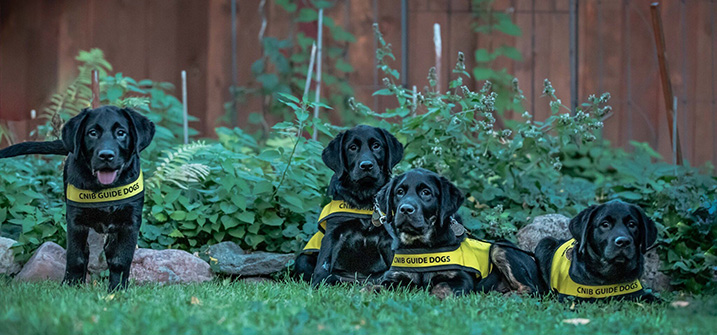
Guide dogs begin their training very early in life – and for four puppies from Brisbane, Australia, their biggest step so far has taken them to Regina, Saskatchewan to work with CNIB Guide Dogs.
Wallace, Indy, Lulu and Percy are black Labrador Retrievers with a family line and upbringing that speaks to a history of service for people who are blind or partially sighted. Since arriving in Canada, these puppies have begun a socialization program, intended to develop their confidence, adaptability and responses to their handlers.
“The success of CNIB Guide Dog teams relies heavily on enrolling the dogs in the program at the right age,” said Tomal Sohorab, Manager, Cargo Product Business Development at Air Canada Cargo. “CNIB Guide Dogs only works with highly reputable breeders who specialize in service animals. The puppies' wellbeing is a priority for everyone involved.”
The puppies’ journey started with a flight from Brisbane to Vancouver, where they were met by veterinarians from the Canadian Food Inspection Agency (CFIA). From there, they flew into Toronto to be greeted by John Collins, an Air Canada station attendant, as well as CNIB Guide Dogs staff. After a brief comfort stop, the foursome travelled to Regina where they first met their volunteer puppy raisers.
“The puppies were in a healthy condition to travel because of the high level of care they receive. They also met our safety and weight requirements because of the breed,” explains Felix Marcoux, Cargo Procedures and Operational Support Manager at Air Canada Cargo. “They were shipped in pairs so that they would sleep for most of the flight and benefit from having each other’s company in the carriers.”
For the next 10-13 months, these puppies will learn basic obedience and socialization skills. Then, they'll start formal guide dog training. Once the puppies are partnered with Canadians with sight loss, CNIB Guide Dogs will provide training where it's accessible and convenient for the handlers, whether that's at home or a central location.
“All the employees involved with these puppies did an exceptional job,” Tom adds. “We’re proud to play a part in the future of these special dogs."
“We’re thankful that Air Canada has helped us ensure these puppies get the best possible start,” says Karen Hanlon, Manager, Canine Development and Training, CNIB Guide Dogs. “Whether it’s avoiding obstacles, stopping at curbs and steps or negotiating traffic, these future guide dogs will foster independence for Canadians who are blind or partially sighted.”
Visit CNIBGuideDogs.ca to learn more about CNIB Guide Dogs.
Photo Credit: BootLick Photography
